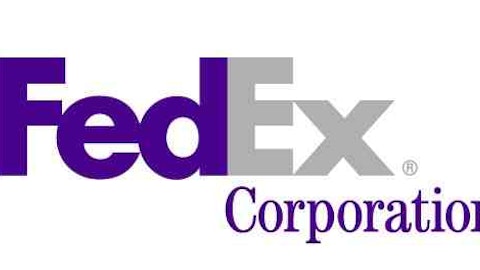
A Defensive Play in More Ways Than One
Unless you’ve been living under a rock, pretty much everyone knows that the government is looking to cut defense spending in order to get the budget in line. Companies like Lockheed Martin Corporation (NYSE:LMT), Northrop Grumman Corporation (NYSE:NOC), Raytheon Company (NYSE:RTN), and even The Boeing Company (NYSE:BA), have to adjust their expectations for defense spending over the next several years.
The two ways that investors can play this adjustment are to either look away from the defense sector, or try to find the best value among these companies. For investors looking to diversify away from just defense, The Boeing Company (NYSE:BA) would seem to be the logical choice. The company’s large backlog of airplane orders should provide a level of certainty to the company’s results in the future. For investors willing to stick with a defense-related company, Lockheed Martin appears to offer the best combined value.
In a low interest rate environment like today, it’s hard to argue that Lockheed Martin Corporation (NYSE:LMT)’s current yield of about 4.2% isn’t attractive. While the competition offers yields of roughly 3% at Northrop Grumman Corporation (NYSE:NOC) and 3.25% at Raytheon Company (NYSE:RTN), there’s something to be said about a yield over 4%. In addition, analysts generally expect better growth from Lockheed versus its competition over the next few years.
Lockheed is expected to grow earnings by about 7.3%, compared to 6.15% at Raytheon Company (NYSE:RTN) and a rate of negative 2.6% at Northrop Grumman Corporation (NYSE:NOC). While it’s true that The Boeing Company (NYSE:BA) is expected to increase earnings by nearly 14%, this has more to do with the company’s backlog of airplane orders than anything defense-related. Between Lockheed’s over 4% yield and respectable growth rate, it seems like a fair bet that this company could be a decent defensive play for many investors.
Current Results Versus Future Opportunities
Many investors might not have been very impressed with Lockheed Martin Corporation (NYSE:LMT)’s last earnings report, even though the company increased EPS by 15%. While it’s true that three of the five main business units at the company reported increased sales, some of the divisions that saw sales decreases were also the larger units at the company.
The good news for investors is, though Lockheed had a challenge growing sales, the same cannot be said about their cash flow. In fact, the company reported that their core operating cash flow (net income + depreciation) increased by 10.46%. This cash flow growth was second only to The Boeing Company (NYSE:BA), which reported operating cash flow up 13.79%. Given the huge demand for airlines that is propping up Boeing’s results, this is a somewhat unfair comparison and shows just how efficiently Lockheed’s management is running the business.
Lockheed’s performance looks especially strong compared to its defense category competition where Raytheon Company (NYSE:RTN)reported operating cash flow increased 7.37%, and Northrop Grumman Corporation (NYSE:NOC) actually reported a decrease of 4.31%. This has been an ongoing theme at Lockheed Martin Corporation (NYSE:LMT), and investors should watch to make sure the company can continue growing cash flow even in a weak sales environment.
A second positive factor for investors to keep an eye on is the continued strengthening of Lockheed’s balance sheet. While the company still carries net long-term debt of $3.089 billion, this was an improvement over last year’s net position of $4.26 billion. This decrease represents a better than 27% improvement in Lockheed’s balance sheet and is significantly better than the performance turned in by their peers.
For point of comparison, Northrop Grumman Corporation (NYSE:NOC) reported the worst performance with their net long-term debt increasing from $68 million to $754 million on a year-over-year basis. Raytheon Company (NYSE:RTN) basically held steady with just a slight increase in their net long-term debt.
Though The Boeing Company (NYSE:BA) carries a net cash balance, the company’s net cash and investments dropped from $4.585 billion last year to $3.6 billion this year, a significant decline of better than 20%. As you can see, Lockheed Martin is putting its extra cash flow towards shoring up its balance sheet, which not only should improve results but also protect the company against any future downturn in defense spending.
It’s Okay to Be Defensive
In the end, investors in Lockheed Martin Corporation (NYSE:LMT) are treated to the best yield of the group, the second best expected earnings growth, strong cash flow growth, and a better balance sheet. On a relative basis, I would argue the only company that investors might choose over Lockheed Martin in this space would be The Boeing Company (NYSE:BA). Though Boeing pays a much lower yield, their higher growth rate more than makes up for their higher P/E ratio.
If you compare Lockheed to Northrop Grumman Corporation (NYSE:NOC) and Raytheon Company (NYSE:RTN), it really is a no contest. Lockheed pays a better yield, is growing faster, and sells for nearly the same P/E ratio as its lower performing peers. Given the company’s history of rewarding shareholders by increasing the dividend, as the saying goes, maybe “the best offense is a good defense.”
Chad Henage owns shares of Lockheed Martin. The Motley Fool owns shares of Lockheed Martin Corporation (NYSE:LMT), Northrop Grumman Corporation (NYSE:NOC), and Raytheon Company (NYSE:RTN).
The article Don’t Get So Defensive…or Maybe You Should originally appeared on Fool.com.
Chad is a member of The Motley Fool Blog Network — entries represent the personal opinion of the blogger and are not formally edited.
Copyright © 1995 – 2013 The Motley Fool, LLC. All rights reserved. The Motley Fool has a disclosure policy.


